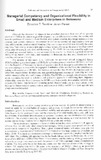Managerial Competency and Organizational Flexibility in Small and Medium Enterprises in Botswana
Date
2005Author
Temtime, Z.T.
Pansiri, J.
Publisher
Business Perspectives; Sumy State University (Ukraine); http://www.businessperspectives.sumy.ua/Type
ArticleMetadata
Show full item recordAbstract
Although the discovery of diamond has propelled Botswana from one of the poorest countries in 1966 to its current stage of development as a middle-income country, the country still faces the problems of economic diversification, employment creation, income generation and distribution, and poverty alleviation. Government and non-governmental organizations have put many efforts on the development of Small and Medium Enterprises (SMEs) to diversity the economy away from mining, to create jobs and alleviate poverty. However, the pace of development of SMEs, after 30 years, is very slow and discouraging. The SMEs failure rate, caused by a plethora of internal and external factors, is now estimated to be over 80%. There is a general consensus among policy makers, politicians, and researchers in Botswana that this trend should not be allowed to continue indefinitely.
The purpose of this paper is to investigate the perceived critical management factors (PCMFs) affecting the development of SMEs by collecting primary date from 203 SMEs in 3 cities in the Republic of Botswana by means of questionnaire. Both descriptive and inferential statistics were employed to present the demographic distribution of the sample firms, the identification, ranking and association of PCMFs. The findings showed that five PCMFs (human resources development; organizational development; managerial background; managerial leadership and competitive strategy) affect the performance of SMEs. The PCMFs are strongly related among themselves, indicating the need for a holistic and systematic approach in addressing them. Important relationships were also found between the PCMFs and firm-specific demographic variables such as ownership status, experience and operating period. Recommendations and implication of the findings for future research, policy makers, practitioners in SMEs, and SMEs support agencies and groups were also forwarded.

